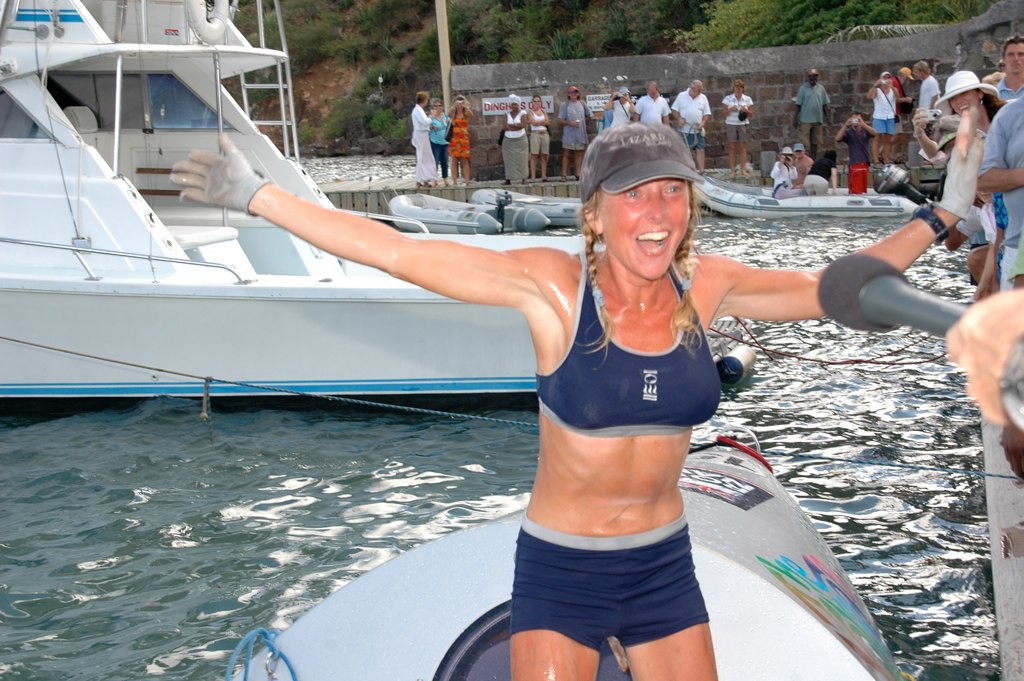by Abigail Carney
Today witnessed a talk by the woman who is arguably the most daredevil of the 2012 Yale World Fellows. When she was thirty-four, Roz Savage decided to write two of her own obituaries. She’d graduated from Oxford, worked as a successful management consultant and investment banker in London, and lived a nice house in the suburbs with her husband. Her first obituary was for her fantasy life, and it thrilled her. Her second obituary, for the life she was living at the time, paled in comparison. The discrepancy between the two was something of an epiphany for her. Two years later she quit her job, four years later she had a divorce, seven years later she was homeless in the middle of the Atlantic Ocean and having “the most miserable time of my life.”

Rox had been a rower at Oxford. So, in the midst of a revolution in her life, she decided to row across the Atlantic Ocean. Alone. She entered a race with twenty-five other boats, but she was the only solo woman competing in an event where six of the crews had to be rescued before completing the journey across the Atlantic. It was the year of Hurricane Katrina, and over the course of her voyage, Roz’s camping stove, phone, and all four of her oars broke. She developed “tendonitis in my shoulders, sores on my bottom, and there were all sorts of other problems you don’t want to hear about.” But despite the miseries of that situation, she had never been so satisfied.
After triumphantly rowing into Antigua, completing the Atlantic and 3,000 miles alone on the ocean, Roz hardly stopped for a break. She proceeded to row the Pacific Ocean, making one stop in Wakiki and one in Tarawa, because the Pacific “is huge,” 8,000 miles across. Most recently, she completed the Indian Ocean, at 4,000 miles her longest continuous route, from Perth to Mauritius. In between and during these incredible voyages, Roz has worked to spread awareness about some of what she’s thought about while rowing alone and looking “at humanity from the outside.” She says there is “nothing like twenty-foot waves to remind you where humans really stand in the scheme of things.”
While she doesn’t brand herself as an environmentalist out of a wish not to alienate people, Roz has committed herself to causes like the attempt to stop the North Pacific Garbage Patch from continually expanding. She has rowed along the outskirts of it, meeting scientists who trawled every day to compare the amount of healthy plankton in the water to the amount of plastic. In the outskirts of the patch there was six times as much plastic as plankton. In the center there was forty times as much plastic. Roz, with her uniquely intimate understanding of the vastness of the ocean, thinks it’s incredible we’ve managed to so alter something so immense.
She says that we have too much stuff, and that somehow, this needs to change. The ocean rowing phase of her career is over and now she’ll be devoting herself entirely to an attempt to “invite people to seek greater happiness while causing less environmental damage.” Hers will be an environmental campaign that doesn’t even use the word “environment.” Roz talks about the failure of country and personal GDPs to measure worth. Her problem with her life before she wrote her two obituaries was that her metric for success was one based in salary and career, not one of happiness or value to the world.
Roz is excited about the Bhutanese metric of happiness. It includes nine domains, one is sustainability, that are important to human thriving. The country makes policy decisions, for example the choice of whether to join the World Trade Organization, based on these questions of wellbeing. Bhutan decided not to join the WTO, and is far more concerned with GNH (Gross National Happiness) than GDP. The UN is now considering implementing use of this metric, and Roz will be involved. She believes that when people begin to consider their lives in a way that falls outside of the traditional definition of what we might call the American dream, they will begin to care less about acquiring energy wasting houses, cars, and mounds and mounds of plastic. It was an inspiring talk. As the audience walked out onto Old Campus, I and many members of the Yale Student Environmental Coalition wondered about what we can do to raise our GNHs, how we can help some part of the environment. Roz joked that we shouldn’t row across any oceans—because, of course, if we all start doing it, she won’t be so outstandingly amazing.
Abigail Carney is a sophomore in Jonathan Edwards college. Contact her at abigail.carney@yale.edu.